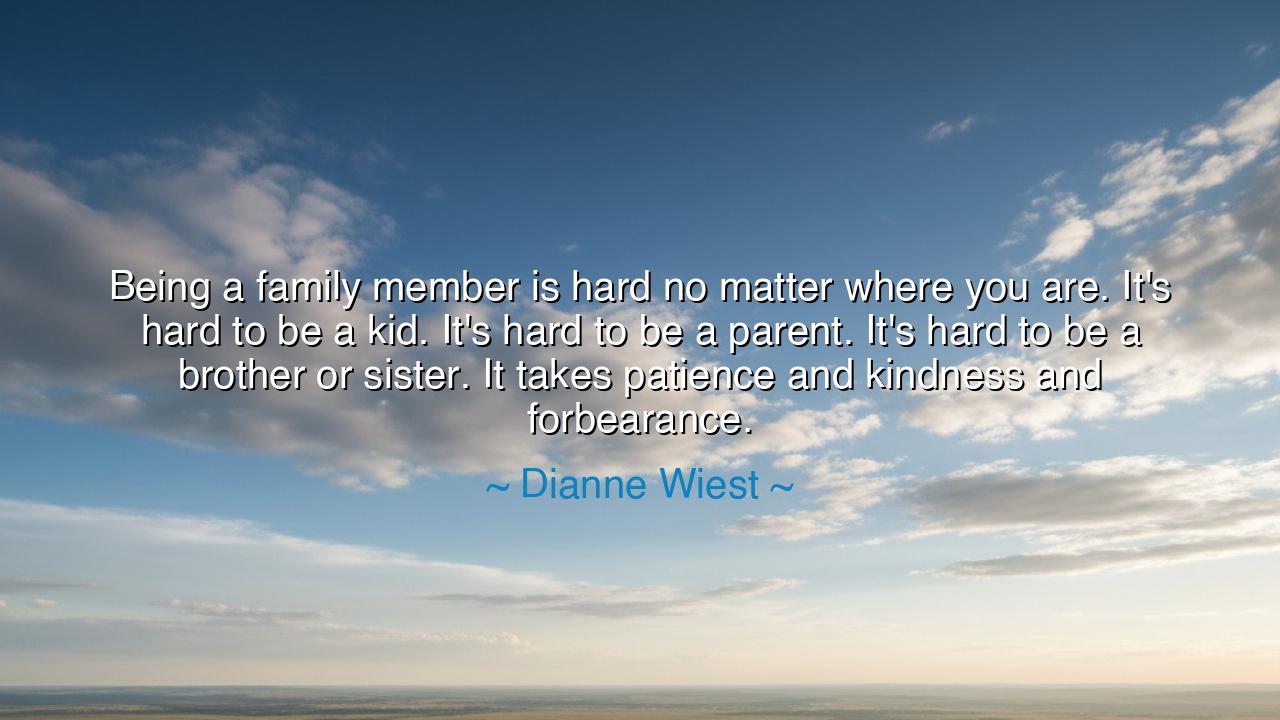
Being a family member is hard no matter where you are. It's hard
Being a family member is hard no matter where you are. It's hard to be a kid. It's hard to be a parent. It's hard to be a brother or sister. It takes patience and kindness and forbearance.






Dianne Wiest once spoke with gentleness and truth: “Being a family member is hard no matter where you are. It's hard to be a kid. It's hard to be a parent. It's hard to be a brother or sister. It takes patience and kindness and forbearance.” In these words, she unveils the eternal struggle of family, that sacred circle where love and conflict dwell together. She does not romanticize the bonds of kinship, but acknowledges their weight—that to live within a family is to walk a path of sacrifice, forgiveness, and daily labor of the heart.
The origin of this reflection lies in Wiest’s long career as both actress and observer of human nature. Through her roles, often steeped in domestic life, she came to understand that the dynamics of parents, children, siblings are never simple. They test our tempers, stretch our patience, and demand our resilience. Yet within those struggles lies the deepest form of growth: the learning of kindness when anger seems easier, the practice of forbearance when one longs to walk away.
History and story both bear witness to this truth. Consider the ancient tale of Cain and Abel, the first brothers. Their conflict, born of jealousy and pride, reveals how difficult it is to bear the role of sibling. Love and rivalry intermingle in the same home, and without patience, destruction follows. On the other hand, consider the tale of Ruth and Naomi, where loyalty, sacrifice, and kindness bound them together across generations. These stories remind us that family can both wound and heal, and that the difference lies in the virtues we choose to practice.
Wiest’s words echo a profound reality: it is hard to be a child, for children must navigate a world they do not understand, often feeling powerless in the face of authority. It is hard to be a parent, for parents must guide without crushing, discipline without embittering, love without losing themselves. It is hard to be a sibling, for brothers and sisters share both intimacy and rivalry, testing the limits of patience in ways no stranger ever could. In each role, the heart is stretched and refined.
The virtues she names—patience, kindness, and forbearance—are not passive, but heroic. Patience is the strength to wait without anger. Kindness is the courage to give love even when one feels hurt. Forbearance is the noble restraint to endure offenses without striking back. These virtues are not easily won; they are forged in the daily fires of family life. To practice them is to transform hardship into holiness, and conflict into growth.
Let us take this lesson to heart. Families will always carry tensions; there is no house where misunderstanding does not dwell. But those who choose patience instead of impatience, kindness instead of cruelty, forbearance instead of vengeance, will create a sanctuary of love even amid trial. In such families, children grow in confidence, parents find joy in sacrifice, and siblings learn loyalty that lasts beyond years.
Practical action flows from this teaching. Pause before speaking harsh words. Remember that every member of a family bears invisible struggles. Choose to forgive quickly, and to listen deeply. Teach children not only by words but by the example of calm and compassion. And when conflict arises—as it surely will—let patience be your shield, kindness your sword, and forbearance your crown.
Thus let Dianne Wiest’s words be preserved as wisdom for the ages: family is hard, but it is holy. It is in the difficulty that we grow, in the testing that we are refined, and in the struggle that we learn to love with endurance. To be a true member of a family is not to escape hardship, but to transform it into strength, tenderness, and faithfulness.






AAdministratorAdministrator
Welcome, honored guests. Please leave a comment, we will respond soon